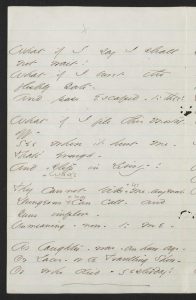What if I say I shall
not wait!
What if I burst the
fleshly Gate –
And pass Escaped – to thee!
What if I file this mortal –
off –
See where it hurt me –
That’s enough –
And step in Liberty!
They cannot take us me – any more!
Dungeons may can call – and
Guns implore –
Unmeaning – now – to me –
As laughter – was – an hour ago –
Or Laces – or a Travelling Show –
Or who died – yesterday!
Link to EDA manuscript. Originally in Packet XIV, Mixed Fasciles, ca. 1860-1862. First published in Poems (1891), 107, as two six-line stanzas, with the alternatives adopted. Courtesy of Houghton Library, Harvard University, Cambridge, Mass.
Readers view this poem as referring to suicide, which can be seen as the ultimate choice, choosing to live or not, a human rebellion against the dictates of God and Nature. Certainly, the word “file” in line 4 echoes Dickinson’s use of it in “Of all the souls that stand create” and connects these poems: “When Sense from Spirit – /files away.” Here, though, it has an identifiable subject: “What if I file this mortal off,” which suggests direct agency and deliberation, if not gruesome self-harm.
This poem is unusual because Dickinson almost always prefers the present earthly life to the future Heavenly one, sometimes to the point of blasphemy. Yet here, the speaker wonders whether to “file this mortal off” will produce the desired “Liberty” in a condition in which life is associated with “dungeons” and “guns imploring” (by being held at gunpoint?), with “Laces” that constrain (suggesting women’s corsets and fitted clothing), with the illusions of a “Travelling Show.”
The poem has been copied in ink, but variations were written, presumably at a later time, in pencil, suggesting that Dickinson came back to this poem. In line six, the variant for “step” changes the phrase to “wade in Liberty,” intensifying the fantasy of death as release, and echoing another poem from this period, “I can wade Grief – Whole Pools of it” (F312A, J252). In line seven, the variant for “me” is “us,” so that “They cannot take us – any more!” is not just about the speaker but a companion or lover who is also repressed and captivated. At least they are together.
The tenses and temporality are also telling. The poem begins in speculation: “What if” repeated three times. In the third stanza, it’s as if this vision has come to pass and the speaker is not just imagining being beyond capture or harm, but has achieved it. William Shurr argues:
It takes a rather unimaginative seriousness to read this poem, so full of wit and hyperbole, as a suicidal threat. It is a lover’s mock protest, rather, addressed to her beloved “thee.”
Certainly, there is irony in the last line: once I am dead or free, the knowledge of “who died – yesterday” will be meaningless to me. But with that also goes “laughter.”
Sources:
Shurr, William. The Marriage of Emily Dickinson: A Study of the Fascicles. Lexington: University Press of Kentucky, 1983, 40, 84.


